Prelude – A smiling jazz trio sings of perfect life in an affluent, unnamed suburban town, with its little white houses and happy, loving families ("Mornin' Sun"). The town could be anywhere; many names (such as Ozone Park and Beverly Hills) are mentioned.
Scene I – Real life in suburbia contrasts greatly with what the Trio has painted. Sam and Dinah are having breakfast, alternating between habitual bickering and lyrical moments of longing for kindness. Dinah is angry with Sam. She accuses him of having an affair with his secretary, which he denies. She also reminds Sam that their son Junior's play is that afternoon, but Sam insists that his handball tournament at the gym is more important, to which she retorts, "To hell with the gym". She needs more money to pay for her analyst, who Sam calls an "out-and-out fake". Dinah says Sam should go too, which suggestion Sam pays no attention to. They agree that this is not the way to live, and they will have a conversation about their relationship problems in the evening. They both ask each other for kindness, ask the other for help "to love you again" and pray that the wall built up between them can be broken down. They continue to argue until Sam leaves for the office, late for his train.
Scene II – Sam, at work, exuding confidence, is dealing with business on the telephone. On the phone, he turns down entreaties from Mr. Partridge, presumably for a loan. The chorus calls him a genius and a "marvelous man".
Then comes a call from "Bill", who he is glad to lend money to: "You'll return it whenever you want to... Is it sufficient?" Coincidentally, Bill is also participating in the handball tournament with Sam. The chorus observes that "When it comes to the giving, no one touches big-hearted Sam".
Scene III – In her analyst's office, Dinah recalls a dream about finding an imaginary garden amid a "black and bare" landscape, and sings about the image longingly.
Meanwhile, at Sam's office, he asks his secretary if he ever made a pass at her. When reminded of an incident, he insists, in a menacing way, that it was an accident and that she should forget that it ever happened.
Scene IV – Sam and Dinah accidentally run into each other on the street. Rather than having lunch with each other, they both make up lies about imaginary commitments to lunch with others. They continue to sing on the stage (though not to each other), reflecting on the confusing and painful course their relationship has taken, and yearn for their lost happiness.
Interlude – Inside the house, the Trio sings of lovely life in Suburbia, detailing the possessions that contribute to the American Dream.
Scene V – At the gym, Sam has just won the handball tournament. He sings triumphantly that "There's a law about men" — how some try with all their might to rise to the top, but will never win; while others, like him, are born winners and will always succeed. "Men are created unequal."
Scene VI – In a hat shop, Dinah tells an unidentified person about a South Sea romance movie called "Trouble in Tahiti", which she has just spent the afternoon watching. (Later, we learn that she has missed Junior's play.) At first she dismisses the movie as Technicolor drivel. But as she recounts the story and its theme song "Island Magic", backed by the Trio, she gets caught up in the escapist fantasy of love. Suddenly self-conscious, she stops herself, as she has to prepare dinner for Sam.
Scene VII – About to enter his home, Sam sings of another law of men — that even the winner must pay "through the nose" for what he gets.
The Trio sings of imaginary evenings of domestic bliss in Suburbia: "bringing the loved ones together, safe by the warmth of the firelight". After dinner, Dinah is knitting and Sam is reading the paper. Sam decides the time has come for their talk, and Dinah, after asking what he wants to talk about, agrees: "anything you say". Yet Sam can't talk; he doesn't know where to begin. He blames Dinah for interruptions, but she has not said anything. "It's no use", he says. In the only spoken dialogue in the opera, Sam asks Dinah about Junior's play, and she admits she didn't go either. He suggests they go to the movies, to see a new film about Tahiti; Dinah consents. ("Sure, why not? Anything.") As they leave, they each long for quiet and communion, wondering if it's possible to rediscover their love for one another. For now, they opt for the "bought-and-paid-for magic" of the silver screen. The Trio makes its final ironic comment, reprising the movie's "Island Magic" theme song.
Prologue
A chorus sings scattered musical phrases such as "My Heart Shall Be Thy Garden", "Cakes and Friends We Choose With Care", and "Lost Time is Never Found". Some of these themes are repeated throughout the opera. Meanwhile, voices are heard in reaction to a car accident. The victim is Dinah, a wife and mother of two.
Act 1
Friends and family gather at Dinah's funeral. Among the guests are Dinah's brother (Bill), her best friend (Susie), her psychoanalyst, her family doctor and his wife (Doc and Mrs. Doc), and eventually her children (Dede and Junior). Sam, Dinah's widowed husband, stands immobile and isolated in a corner. People are absorbed in their own thoughts and aren't communicating well. In a series of fragmented conversations they discuss the circumstances of Dinah's death (the car accident from the prologue), mourn her loss and reveal some of what has happened to her family over the years. Dede and Junior live in Quebec with a French Canadian, François, who had been romantically involved with Junior, and is now married to Dede. Junior, who has a history of mental illness, has not seen his father in nearly 20 years, and Sam has never met his son-in-law.
When everyone except Junior has arrived, the funeral director announces a ceremony of readings and reminiscences. Doc reads from Proverbs, Mrs. Doc from Elizabeth Barrett Browning (lines chosen by Sam); Bill and Susie offer spirited reminiscences of Dinah; Dede reads from Kahlil Gibran – until she breaks down in tears and François must read for her. Junior's unruly entrance interrupts the ceremony, and no one greets him. At the conclusion of the readings the guests file past Dinah's coffin and depart, leaving Sam, Junior, Dede, and François facing one another for the first time.
Sam's first words are to Junior, but give way to an explosion of 30 years' anger, reprisal, and confused grief directed at all three young people. Sam breaks down crying, but no one goes to him. In a trio of reminiscence, Junior, Dede, and François recall – via half-remembered letters home – a long-ago time when they were close with their fathers. Junior breaks the spell of remembering with a snap and accosts his father violently. He starts to rhyme – a symptom of his psychosis – and goads Sam with an improvised strip blues. They come to blows, and the coffin lid is knocked shut with a crash. Sam exits furiously, then Dede and François. Junior, alone, becomes aware of his disarray and tenderly runs his hand across his mother's coffin.
Act 2
(Incorporating Trouble in Tahiti)
Scene 1
At home later that evening, Sam is alone in the master bedroom. Reading Dinah's old diaries makes him angry, but he also feels love for Dinah and realizes that he misses her. The diary evokes a memory of 30 years ago...
Scene 2
The scene opens with a scat singing jazz trio which advertises the charms of ideal family life in "Suburbia, U.S.A." of the 1950s. Various prosperous American suburbs are mentioned by name, including Wellesley Hills, Shaker Heights, Highland Park, and Beverly Hills.
In their "little white house", Young Sam and Dinah quarrel at breakfast. Among other issues, she accuses him of having an affair with his secretary at work. After ten years of marriage, every day is the same. They wish they could be kind to each other, but there is no real communication between them.
In his office Young Sam clinches a deal, making a business loan with his customary élan. The jazz trio extols his business acumen and big heart. On her psychiatrist's couch Dinah relates a dream; as she struggled to find her way out of a dying garden, a voice beckoned to her, promising that love would lead her to "a quiet place". Young Sam summons his (unseen) secretary to his office, pointedly asks if he has ever made any passes at her, and takes her quiet demurrals as acquiescence to his version of what happened.
At lunchtime, Young Sam and Dinah have a chance meeting on the street, in the rain. They both pretend to have lunch dates elsewhere, then wonder to themselves why they lied. What has happened, they ask themselves, to dull their love? Can't they find their way back to the garden where they began?
Scene 3
Old Sam's reverie is interrupted when Dede comes shyly to visit him. As they go through cartons and clothes in Dinah's closet, they start to reach out to each other. Next door in Junior's room, François confronts Junior with his behavior at the funeral parlor. François' anger provokes a psychotic phase that takes Junior through some painful associations to an important revelation – that he loves and needs his father. Meanwhile, Dede has tried on a dress which vividly recalls to Sam the young Dinah. Father and daughter embrace, Junior collapses in François' arms.
Dede and François meet in the hallway – she is elated, he is exhausted. François breaks down in her arms, overcome by the strain of the day, and Dede comforts him. He is moved by her strength and embraces her passionately. When they leave, Sam goes into Junior's room. He tries to kiss his sleeping son but can't yet: he's still too conflicted. He finds a sports trophy on a shelf, which reawakens his memory...
Scene 4
The scene opens as the jazz trio reprises its paean to the American suburban dream.
In that distantly remembered afternoon, rather than going to Junior's school play, Young Sam has competed for a handball trophy and won. As he showers he proclaims that there are some men, like himself, who are just born winners and some men "who will never, ever win".
Also avoiding Junior's play, Dinah goes to a movie – a trite Technicolor musical called Trouble in Tahiti. She finds it awful and describes it scene by scene, but is increasingly caught up in replaying the cornball plot, especially the big escapist musical number "Island Magic". Suddenly she returns to reality and rushes home to make dinner. Young Sam approaches his front door that night with his trophy, but with dread – even winners "must pay through the nose".
As the jazz trio sings of evening shadows and loved ones together, Young Sam and Dinah try to have a talk after dinner, but they cannot make any headway. Young Sam wearily suggests going to the movies – some new musical about Tahiti. Dinah ruefully agrees. Mourning the lost magic between them, they seek out the "bought-and-paid-for" magic of the silver screen.
Old Sam remembers...
Act 3
Dede is up early the next morning, weeding in her mother's once-splendid, now overgrown garden. She senses Dinah's unseen presence and speaks to her, remembering when they were close. Junior, in high spirits, appears with breakfast. Brother and sister play games remembered from childhood and reenact their parents' quarrelsome breakfasts. François joins them in the midst of a tag game, and in another trio of remembrance – for which time stands still – they relive the first meeting of Dede and François some 10 years before.
Now Old Sam appears in the garden and the game of tag resumes. It ends when Sam decides that rather than be tagged by François, he will open his arms to him and welcome him to the family. Sam reads aloud from Dinah's diary. The last entry he reads starts everyone giggling, and they release some of their sadness in shared laughter. The kids tell Sam they are thinking of staying on a few days, and all four euphorically imagine the joys of being together – until a little disagreement becomes a vicious argument. At its climax Junior hurls Dinah's diary into the air, and everything they have achieved since the debacle at the funeral parlor falls down around them. They stop, their anger spent, and look at the pages of the diary scattered on the ground. Thinking of Dinah and of her words, they recognize, one by one, that they can learn to communicate – indeed, that they must – as difficult as it will be for them. They reach out once again to one another.


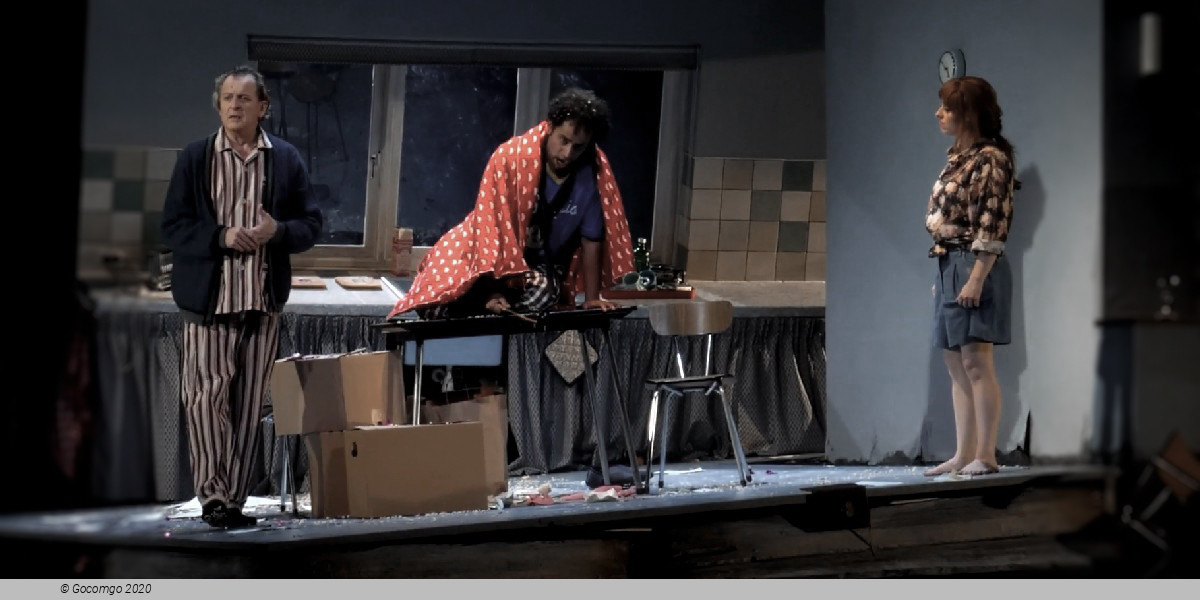
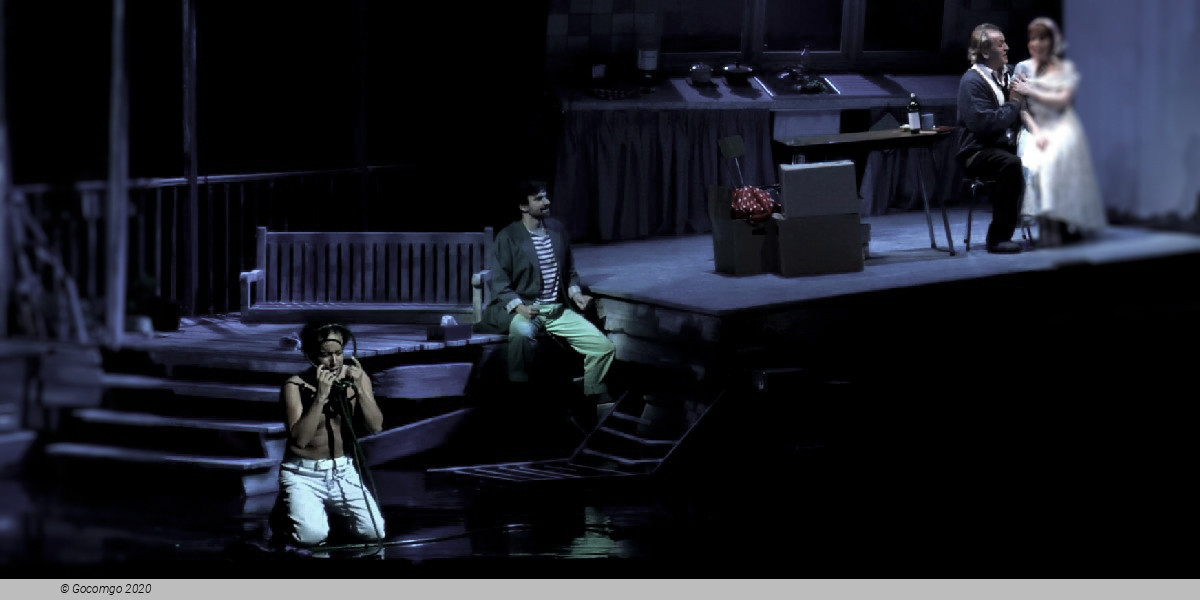
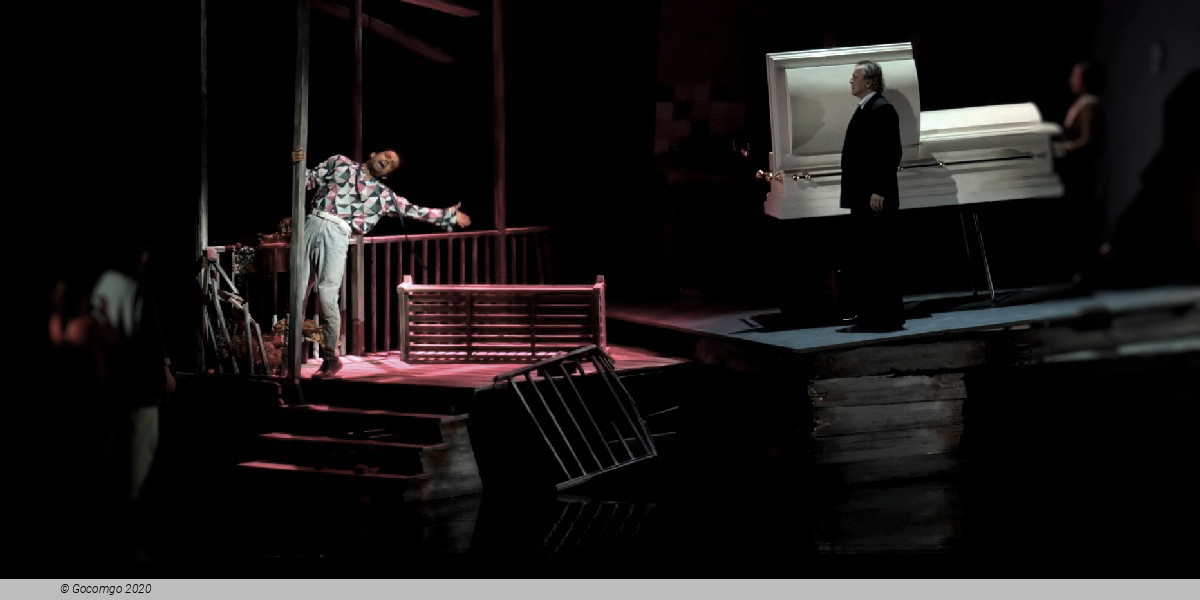
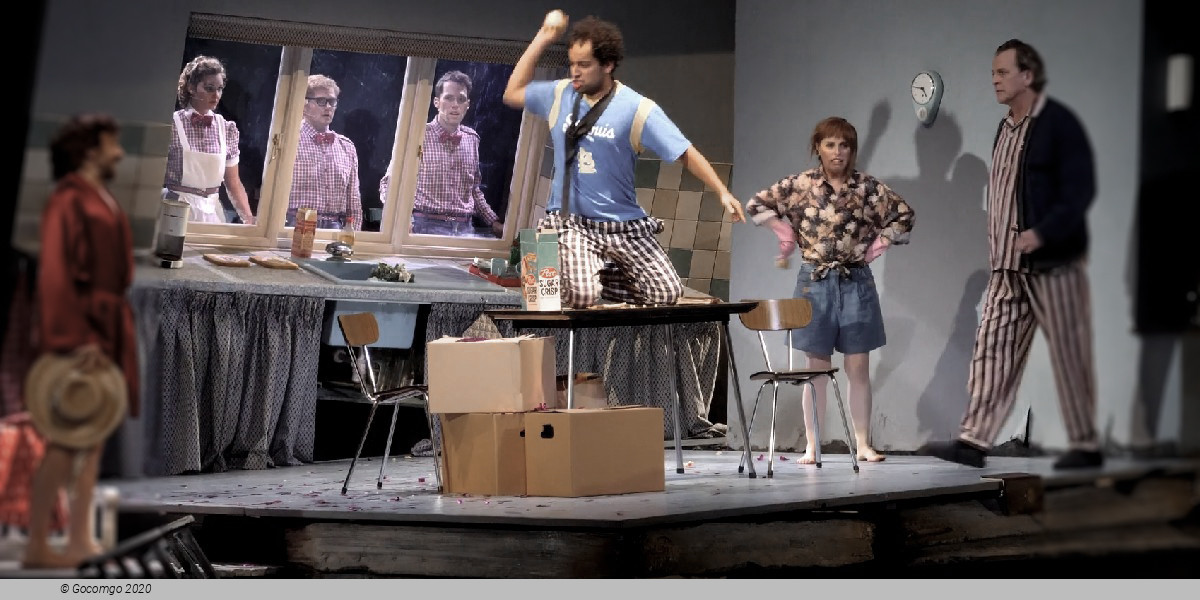
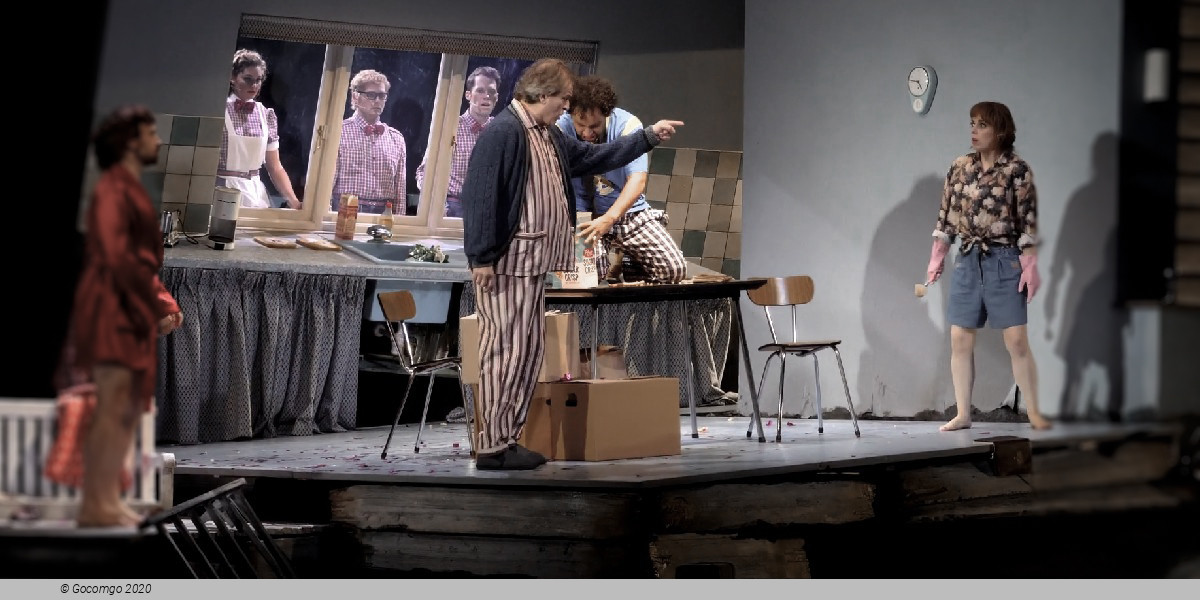
 Bow St, Covent Garden
Bow St, Covent Garden